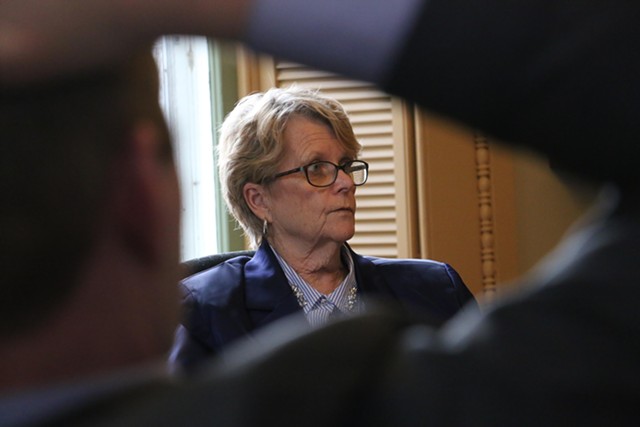
- Kevin McCallum ©️ Seven Days
- Sen. Ann Cummings (D-Washington) discussing H.850 on Thursday
Lawmakers on Friday raced to advance a bill that would let school districts postpone budget votes until April 15, despite pleas from residents of districts who fear massive property tax increases if the current cap on them is repealed as proposed.
Members of the Senate Finance Committee voted in favor of H.850 on Friday. The day before, Stowe residents told the committee that even after their school budget was slashed, they’re still facing a 27 percent tax increase that threatens to drive working-class residents from their homes.
Sen. Ann Cummings (D-Washington), who noted that she may have trouble paying her own higher tax bill, nevertheless rejected calls to delay a vote. She said it was more important to give towns clarity about the new rules for school budgets as Town Meeting Day approaches .
“I think towns need to know that this is not getting tied up in the Senate and the 5 percent cap is gone,” Cummings said before Friday’s vote.
Despite criticism that the bill would do little to help towns blindsided by soaring property tax rates, it now heads toward a full vote in the Senate on Tuesday.
The bill, which sped through the House this week, is an emergency update to Act 127. The 2022 law was meant to increase funding to districts with higher per-student costs, such as rural schools or those with more low-income students or English language learners.
The result was that schools with fewer such students faced a drop in state education funding. To ease the transition for what was expected to only be a handful of negatively affected districts, Act 127 contained 5 percent caps on property tax increases for those communities.
But this “transition mechanism” failed spectacularly this year as rising health care costs, general inflation and construction expenses sent school spending soaring this year, pushing all districts past the tax cap.
Sen. Tom Chittenden (D-Chittenden-Southeast) said he felt the cap “created a perverse incentive” for districts to spend because they knew doing so wouldn’t increase their property taxes past 5 percent.
The new bill repeals the cap, exposing dozens of districts to property tax increases that in some cases approach 40 percent. To soften this more painful blow, H.850 would replace the cap with a “cents discount,” or a tax discount for negatively affected districts that would be gradually phased out over five years.
The bill also allows affected districts to cancel their Town Meeting Day votes on school budgets, rework the numbers and have a vote before April 15. It requires clerks to automatically send new absentee ballots to anyone who requested one for Town Meeting Day and sets aside $500,000 to help districts pay for the new elections.
Chittenden said he hoped that districts stripping extra money out of their budgets could save the state "$100 million or more" and lessen the tax pressure on districts across the state.
Sen. Mark MacDonald (D-Orange) used an aviation analogy to describe the unprecedented scenario.
“We’re coming in for a landing that we’re uncomfortable with. We’re going to circle around and try to land again,” he said.
Cummings, chair of the Finance Committee, said the Senate was under intense pressure to pass the bill because communities need to know whether to move forward with their Town Meeting Day votes or not.
“We need to get it out in fairness to the towns,” she said. “It won’t be perfect.”
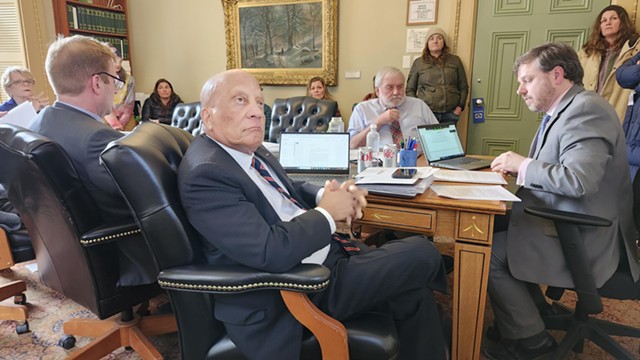 The fairest thing, Stowe residents argued, would be to scrap the bill and rewrite it to cap the runaway spending in districts across the state.
The fairest thing, Stowe residents argued, would be to scrap the bill and rewrite it to cap the runaway spending in districts across the state.
The Stowe School District, which is part of the Lamoille South Supervisory Union, is one the districts being hardest hit by Act 127.
At an emergency meeting on Wednesday, Stowe’s school board voted to cut $1.6 million from its previously warned budget and to hold its budget vote on March 15 rather than March 5.
The new budget of $17.2 million — which eliminates one teacher position and removes $1.5 million for what Lamoille South superintendent Ryan Heraty characterized as “critical safety needs” — represents a 10 percent increase from last year.
Members of the Senate Finance Committee voted in favor of H.850 on Friday. The day before, Stowe residents told the committee that even after their school budget was slashed, they’re still facing a 27 percent tax increase that threatens to drive working-class residents from their homes.
Sen. Ann Cummings (D-Washington), who noted that she may have trouble paying her own higher tax bill, nevertheless rejected calls to delay a vote. She said it was more important to give towns clarity about the new rules for school budgets as Town Meeting Day approaches .
“I think towns need to know that this is not getting tied up in the Senate and the 5 percent cap is gone,” Cummings said before Friday’s vote.
Despite criticism that the bill would do little to help towns blindsided by soaring property tax rates, it now heads toward a full vote in the Senate on Tuesday.
The bill, which sped through the House this week, is an emergency update to Act 127. The 2022 law was meant to increase funding to districts with higher per-student costs, such as rural schools or those with more low-income students or English language learners.
The result was that schools with fewer such students faced a drop in state education funding. To ease the transition for what was expected to only be a handful of negatively affected districts, Act 127 contained 5 percent caps on property tax increases for those communities.
But this “transition mechanism” failed spectacularly this year as rising health care costs, general inflation and construction expenses sent school spending soaring this year, pushing all districts past the tax cap.
Sen. Tom Chittenden (D-Chittenden-Southeast) said he felt the cap “created a perverse incentive” for districts to spend because they knew doing so wouldn’t increase their property taxes past 5 percent.
The new bill repeals the cap, exposing dozens of districts to property tax increases that in some cases approach 40 percent. To soften this more painful blow, H.850 would replace the cap with a “cents discount,” or a tax discount for negatively affected districts that would be gradually phased out over five years.
The bill also allows affected districts to cancel their Town Meeting Day votes on school budgets, rework the numbers and have a vote before April 15. It requires clerks to automatically send new absentee ballots to anyone who requested one for Town Meeting Day and sets aside $500,000 to help districts pay for the new elections.
Chittenden said he hoped that districts stripping extra money out of their budgets could save the state "$100 million or more" and lessen the tax pressure on districts across the state.
Sen. Mark MacDonald (D-Orange) used an aviation analogy to describe the unprecedented scenario.
“We’re coming in for a landing that we’re uncomfortable with. We’re going to circle around and try to land again,” he said.
Cummings, chair of the Finance Committee, said the Senate was under intense pressure to pass the bill because communities need to know whether to move forward with their Town Meeting Day votes or not.
“We need to get it out in fairness to the towns,” she said. “It won’t be perfect.”

- Kevin McCallum ©️ Seven Days
- Senators reviewing a bill that would let school districts postpone budget votes
The Stowe School District, which is part of the Lamoille South Supervisory Union, is one the districts being hardest hit by Act 127.
At an emergency meeting on Wednesday, Stowe’s school board voted to cut $1.6 million from its previously warned budget and to hold its budget vote on March 15 rather than March 5.
The new budget of $17.2 million — which eliminates one teacher position and removes $1.5 million for what Lamoille South superintendent Ryan Heraty characterized as “critical safety needs” — represents a 10 percent increase from last year.
Even with the new “cents discount” being proposed, Stowe’s homestead property taxes are projected to go up an eye-popping 27 percent if the legislature takes no further action. To get under a 10 percent tax increase, Stowe would have had to trim its budget to $15 million, according to a school district budget presentation.
That would have meant cutting 19 teaching positions, an action that would have made it impossible to operate the town’s schools, administrators said.
Several Stowe residents attended Thursday’s Senate Finance Committee meeting to urge legislators to consider the devastating impact that lifting the cap would have on their town. Tiffany Donza, chair of the Stowe School Board, told legislators that the core problem, as she saw it, was that Vermont’s education fund can’t be sustained by the state’s small tax base.
Stowe’s school buildings are “dilapidated,” Donza said, but a $39 million bond that would have repaired them “failed miserably” in November because many Stowe residents don’t qualify for lower property taxes based on income and instead pay taxes strictly on the value of their homes.
In comparison, Donza said, Burlington was able to pass a $165 million bond for a new high school in 2022 because the majority of voters are not directly affected by the tax increase.
One longer-term fix, Donza suggested, would be to reform the tax code so that second homeowners and owners of short-term rentals — a substantial group in Stowe — would pay a higher tax rate than businesses.
Currently, all of those categories pay the same nonresidential property tax rate.
In the short term, however, Donza urged lawmakers to ditch the “cents discount,” which she argued wouldn’t do enough to bring down statewide spending, and instead impose a cap of 10 to 15 percent on a district’s total year-over-year spending.
“It will put a damper on the fire that is raging in the state. It is the only thing that will,” she said.
Pua Kielland, a parent of two who rents a home in Stowe, said the town is already facing an affordability crisis. Homes that come on the market get snapped up by second-home buyers, she said. Even if Keilland could afford to purchase a home, she said, to do so with the exorbitant property tax hikes on the horizon “would be insanity.”
Retirees on fixed incomes are also “barely hanging on,” she added.
The testimony spurred senators to brainstorm ideas for how to reduce the property tax hikes, but they didn’t make much progress. Sen. Kesha Ram Hinsdale (D-Chittenden-Southeast) wondered if towns with a lot of second homes — like Stowe — could get relief if such properties are taxed at a higher rate.
The answer from financial analyst Julia Richter was that, while the state education fund might benefit overall from such additional revenue, it wouldn’t help Stowe more than another community. Similarly, senators wondered whether they could tap reserves to lower the property tax rate.
They learned from Richter that a $13 million “tax rate offset reserve” was already baked into the calculations. In addition, a $57 million “stabilization reserve” fund could be tapped, but doing so could negatively affect the state’s bond rating — which Cummings said would be unwise given all the school construction on the horizon.
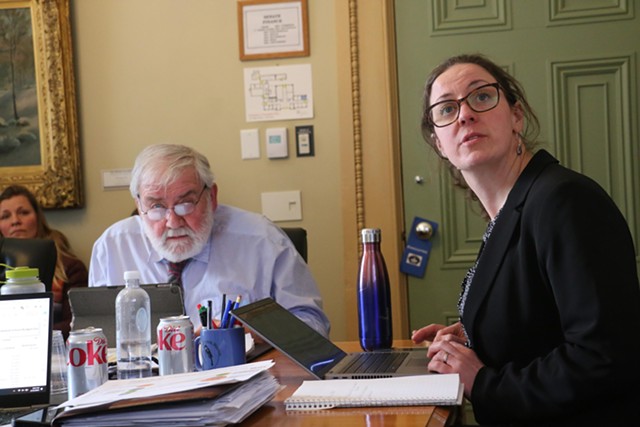
- Kevin McCallum
- Julia Richter, senior financial analyst, walking senators through the bill
Senators rejected the idea for a new spending cap, saying it risked preserving the very inequities between districts that Act 127 sought to resolve.
“Have we ever capped spending on school boards before?” MacDonald asked.
“Not in my lifetime,” Cummings replied.
Alison Novak contributed reporting.
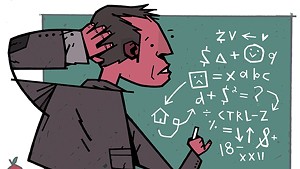
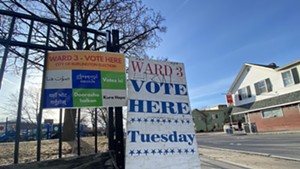









Comments
Comments are closed.
From 2014-2020, Seven Days allowed readers to comment on all stories posted on our website. While we've appreciated the suggestions and insights, right now Seven Days is prioritizing our core mission — producing high-quality, responsible local journalism — over moderating online debates between readers.
To criticize, correct or praise our reporting, please send us a letter to the editor or send us a tip. We’ll check it out and report the results.
Online comments may return when we have better tech tools for managing them. Thanks for reading.